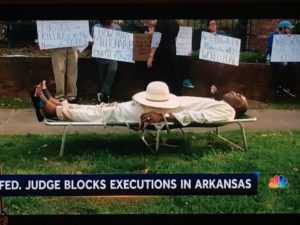An Arkansas judge cleared of ethics charges stemming from his participation in ani anti-death penalty demonstration two years ago has petitioned the state’s Supreme Court to restore his power to hear and decide capital cases.
The Supreme Court of Arkansas issued an order without a hearing on April 17, 2017, barring Circuit Judge Wendell Griffen from presiding over any case involving the death penalty, capital punishment or the state’s method of execution.

Media coverage of Judge Wendell Griffen at death penalty protest in 2017.
Griffen is an ordained Baptist minister and pastor of New Millennium Church in Little Rock, a self-described “community of welcoming, inclusive, and progressive followers of Jesus Christ” affiliated with the Cooperative Baptist Fellowship since its founding in 2009.
The Supreme Court order came after media published a photo of Griffen and fellow church members attending a prayer vigil outside the governor’s mansion on Good Friday 2017 protesting a series of executions scheduled for the week after Easter.
During the protest Griffen, who was not wearing anything to indicate he was a judge, lay motionless on a cot. He later explained the act as posing as a dead man “in solidarity with Jesus, the leader of our religion who was put to death by crucifixion by the Roman Empire.”
Two weeks ago the Arkansas state Judicial Discipline and Disability Commission dropped charges that Griffen’s protest violated judicial ethics after failing to prosecute the complaint within an 18-month statute of limitations.
With that, Griffen’s attorney Mike Laux said June 25, there is no “conceivable basis” for continuing to punish the judge with what currently amounts to a lifetime ban.
“While the lifetime ban on his hearing capital cases was always unwarranted, it is now completely unsustainable,” the attorney said in a press release.
In a petition filed with the Arkansas Supreme Court June 24, Griffen, who is African-American, said to his knowledge no white member of the Arkansas judiciary has ever been summarily banned from hearing an entire class of cases.
A white judge who pleaded guilty to driving while intoxicated after driving through a police sobriety checkpoint and prompting a high-speed chase in 2017, for example, was banned from presiding over DWI cases for eight months after being convicted of a crime.
Griffen’s penalty has been in effect for more than two years – three times longer than the other judge – and he “remains permanently barred despite not having been found guilty of any illegal or otherwise disqualifying conduct,” according to the petition.
In the meantime, 17 capital cases have bypassed Griffen and gone to other judges, the petition says, harming voters who elected him to the bench in 2010 and again in 2016.
“Each day Judge Griffen is barred from hearing capital cases is another day that voters and citizens in his subdistrict are deprived of their choice of a fully empowered circuit judge who they elected to hear all civil and criminal cases, including death penalty cases,” Laux said.
On the same day as the Good Friday protest Griffen signed an order temporarily blocking the state from using an execution drug the pharmaceutical company that distributes the medicine for other uses said was obtained under false pretenses.
Griffen, who blogs and preaches frequently about social-justice issues, says while his religious views opposing capital punishment are well-known, they have no bearing on his ability to rule impartially on matters of the law. Donning a judicial robe, he says, does not mean he surrenders his civil rights.
Previous story:
Report: Ethics complaint against anti-death penalty pastor/judge dismissed
